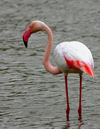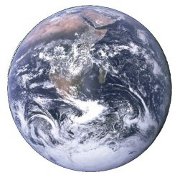
Custom Search
Animals in Cape Verde
The Cape Verde islands are a geographically isolated group of volcanic islands lying in the Atlantic Ocean about 350 miles from the west African coast. Because of their relative isolation and near-desert aridity, the Cape Verde islands host a variety of native species unique to this island group.
Unlike many similarly isolated island groups, the Cape Verde islands have a wildly varying topography, ranging from flat sand beaches to precipitous mountains, with both temperate and tropical climate zones represented. Rainfall is sparse, and there are no surface sources of fresh water. Extensive tree planting in modern times has had an impact on the native environment.
The only land mammal native to the Cape Verde islands is the grey long-eared bat. Feral goats, rodents and monkeys have all been introduced later by humans. Sea mammals abound, and the Cape Verde islands are an important stopping off point for humpback whales. Sperm whales,
humpback whales. Sperm whales,  blue whales, beaked whales, dolphins, and pilot whales also visit the waters around the Cape Verde islands, perhaps because of the extensive volcanic reefs surrounding the islands, which act both as a refuge and larder for fish. Five species of marine turtle frequent the islands between May and October, including the rare and endangered loggerhead sea turtle. Porpoises,
blue whales, beaked whales, dolphins, and pilot whales also visit the waters around the Cape Verde islands, perhaps because of the extensive volcanic reefs surrounding the islands, which act both as a refuge and larder for fish. Five species of marine turtle frequent the islands between May and October, including the rare and endangered loggerhead sea turtle. Porpoises,  barracudas,
barracudas,  moray eels, and sharks are also found in abundance in the waters around the Cape Verde islands.
moray eels, and sharks are also found in abundance in the waters around the Cape Verde islands.
The Cape Verde islands are visited by over 130 species of migratory birds; approximately 40 of these bird species nest on the islands. The Greater Flamingo and the Egyptian vulture are particularly striking specimens. The only known breeding population of the critically endangered Bourne's Heron is found on Santiago Island in the Cape Verde archipelago. Four species of ground birds are endemic to the island: the Cape Verde sparrow, the Cape Verde swift, the endangered Raso lark, and the Cape Verde warbler.
Greater Flamingo and the Egyptian vulture are particularly striking specimens. The only known breeding population of the critically endangered Bourne's Heron is found on Santiago Island in the Cape Verde archipelago. Four species of ground birds are endemic to the island: the Cape Verde sparrow, the Cape Verde swift, the endangered Raso lark, and the Cape Verde warbler.
There are 12 species of lizards native to the Cape Verde islands, including a rare giant skink and a giant gecko. There are no snakes - either poisonous or non-poisonous - but there are over fifty species of spiders and scorpions.
Unlike many similarly isolated island groups, the Cape Verde islands have a wildly varying topography, ranging from flat sand beaches to precipitous mountains, with both temperate and tropical climate zones represented. Rainfall is sparse, and there are no surface sources of fresh water. Extensive tree planting in modern times has had an impact on the native environment.
The only land mammal native to the Cape Verde islands is the grey long-eared bat. Feral goats, rodents and monkeys have all been introduced later by humans. Sea mammals abound, and the Cape Verde islands are an important stopping off point for




The Cape Verde islands are visited by over 130 species of migratory birds; approximately 40 of these bird species nest on the islands. The

There are 12 species of lizards native to the Cape Verde islands, including a rare giant skink and a giant gecko. There are no snakes - either poisonous or non-poisonous - but there are over fifty species of spiders and scorpions.
Click here for a list of endangered animals in Cape Verde.
Carnivores in Cape Verde
Slender mongooseDolphins, porpoises, and whales in Cape Verde
Blue whale Bunch Blainville's beaked whale Common porpoise Bridled dolphin Atlantic spotted dolphin Long-beaked dolphinBats in Cape Verde
Kuhl's pipistrelle Gray big-eared bat Information about the animals living in Cape Verde is brought to you by "List of countries of the world", your first stop in discovering all countries and animals of the world.
Information about the animals living in Cape Verde is brought to you by "List of countries of the world", your first stop in discovering all countries and animals of the world.The animals displayed on this page are grouped in their scientific order. View also countries of the world ordered by:
- List of TLD's
- Country dialling codes
- Population
- Kilometers of coastline
- Square kilometers of land
- Square kilometers of water
- Birth rate
- Death rate
- Irrigated land
- Countries starting with A
Privacy policy